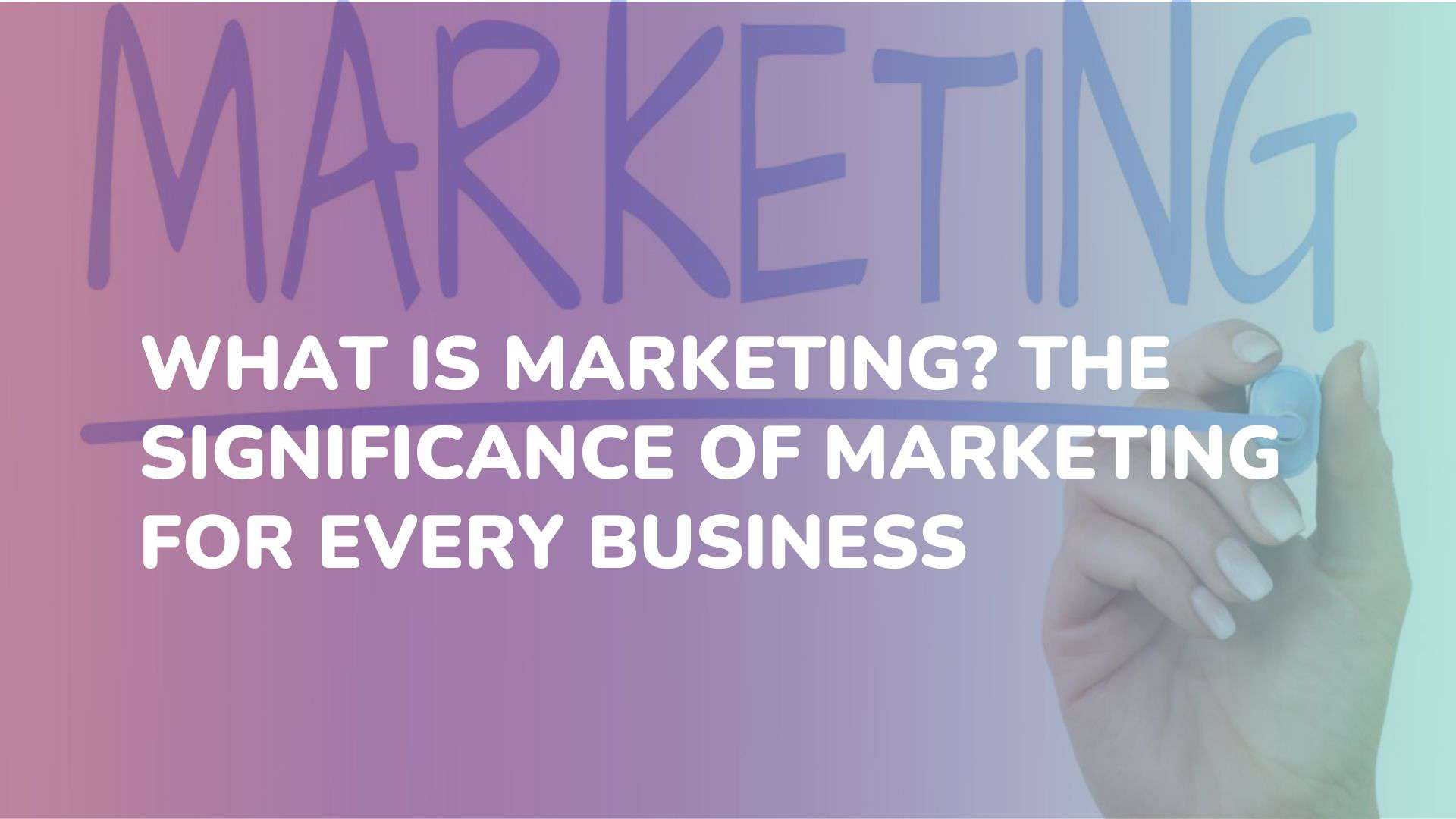What is Marketing? The significance of marketing for every business
Do you want to know what customers think about you? Are you worried if your product has enough trust with customers? When was the last time you received feedback on the quality of your product or service? Was it a complaint or praise? The answers to all these questions lie within the marketing activities of every business. So, what is marketing?
In today’s world, there’s an abundance of products, services, technologies, solutions, business models, and more. These new innovations need to be brought to the market and commercialized to generate revenue and profits. However, Marketing has become one of the main driving forces behind the business activities of companies.
What is Marketing?
Answering the question “What is Marketing?” the American Marketing Association defines it as: “The process of creating, communicating, delivering, and exchanging offerings that have value for customers, clients, partners, and society at large.”
It’s clear that the definition of Marketing is quite diverse. However, if understood in simpler terms, Marketing is the process by which a business creates exceptional value for customers and builds a strong relationship with them to harvest value from the customer relationship.

First and foremost, Marketing must “create exceptional value for customers.” Without creating value for customers, your business will fail. If you do create value, you need to go beyond and gain a competitive advantage. The reason is that many other businesses are also creating and delivering value to their customers.
Therefore, in the business market, the money you receive (revenue) will somewhat correspond to the value you give.
Marketing and its Historical Development
The development of Marketing is not an inevitable activity; it is the result of an ongoing process of formation and development. The concept of Marketing was first used in the United States between 1906 and 1911; it has since undergone profound transformations through various eras.
The Era of Production: During this era, businesses operating in a developing economy focused solely on producing quality products and then finding buyers for them. Their main priority was mass production to minimize costs. They believed that cost reduction in production could lead to profitability, so they sold their products to customers at lower prices.
The Era of Sales Effort: This is an important stage in the development of Marketing. Manufacturers began to focus on efficient sales efforts to find as many potential customers as possible to consume their output products. Communication, advertising, and brand-building became more important as businesses had to compete strongly in a growing market.

The Marketing Era: A significant viewpoint was affirmed during this period: “The key to achieving the organization’s goals is to identify the needs and desires of target markets and ensure satisfaction with these desires through effective methods compared to competing opponents.” This perspective has changed and helped businesses organize more efficient business activities to create, deliver solutions, and communicate with their customers.
The Social Marketing Era: This era began in the 1970s and continues into the 21st century, asserting that businesses have shifted to an era of marketing-oriented customer relationship management (CRM): customers, suppliers, distributors, and other marketing partners. Relationship marketing establishes a relationship between the economic, technical, and social sustainability.
The Social Networking Era: The Internet, smartphones, social media, and more are the future of Marketing. This era began around 2010. If your business has not undergone digital transformation at this time, you and your peers are lagging far behind the era.
Marketing’s Importance in Business Development
Regardless of the scale of your business, whether it’s large or small, and whatever sector it operates in, Marketing can help increase your business’s sales revenue. In fact, Marketing has become one of the crucial factors determining the success or failure of a business operation.
Marketing helps businesses increase their sales revenue. Ultimately, the main purpose of Marketing is to trigger potential customers’ purchasing decisions. This is accomplished through activities such as finding and identifying potential customers, communicating with them, and persuading them to buy your services.
When a customer is satisfied with your product and service, they will build loyalty to your brand and can even become brand ambassadors who actively promote and advocate for your brand.
Additionally, Marketing helps businesses build and maintain their reputation and image in the eyes of customers. Your business’s reputation is built on how well you meet the needs, desires, and wishes of your customers. You not only have to provide high-quality products and services but also offer excellent customer service and address any issues that may arise in the future with your products and services.
A business with a strong brand identity helps shape customers’ perceptions of the brand. The stronger your brand’s power, the more robust customers’ opinions about you become. Even if a customer unfairly complains about your service, your brand can easily overcome that thanks to this.
A good Marketing strategy also helps businesses build relationships with their customers, including current and potential customers.
Firstly, Marketing helps establish a connection between the business and those who benefit the most from your products or services. This fosters trust and improves their relationship with you. With the right Marketing strategy, you might not even have to persuade others to buy from you. You simply need to show them the reasons why they should and allow them to make the decision themselves.
At higher levels, you can turn customers into repeat buyers or even in some cases (as discussed earlier) into brand advocates. Transforming your business from being just a product into a lifestyle brand—one that people not only buy but also actively want to incorporate into their daily lives—is not an easy feat. But Marketing can assist in achieving that.

Metta – The “weapon” that helps businesses find appropriate development directions and establish a strong brand identity
Understanding the desires of businesses, Metta provides excellent solutions for suitable Marketing strategies and strong brand positioning in the Vietnamese market. Metta functions as an extension of businesses, working closely with relevant departments and business partners.
Metta’s activities range from building and executing brand strategies, multichannel distribution strategies, product strategies, to implementing multimedia communication programs, automated marketing, events, and more.
Metta offers diverse solutions tailored to the needs of various types of businesses. For Metta, your business is considered a valuable asset in order to implement the most effective communication strategies, providing clear and timely reporting to meet business requirements.
Don’t wait until stronger competitors appear; let Metta help your business grow sustainably!
Learn about Metta’s marketing services:
Brand strategy consulting: Supporting business leaders/owners and marketing departments to build effective brand strategies for the Vietnamese market. Brand-building solutions: A mixed marketing solution that focuses on digital technology to build a leading brand. Brand training: Training sessions focusing on brand management and brand building for SMEs and startups.
Written by the Metta Marketing team
Metta Marketing
Leading Brand Strategy Consultant










